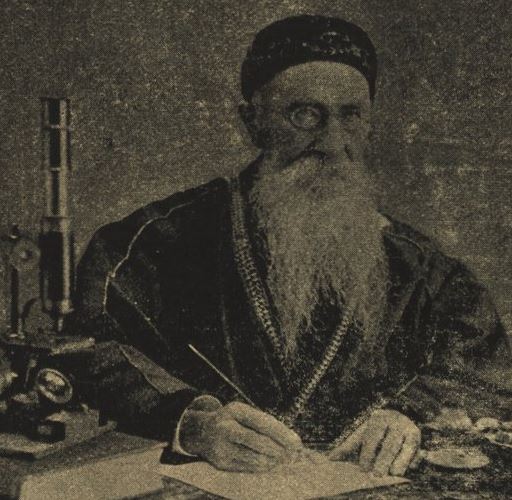
Cornelius Van Alen Van Dyck (b. 1818, Kinderhook, NY - d. Beirut, 1895), an American Medical Missionary and Educator in Syria, and important translator of the Bible into Arabic (published from the 1860s>).
BABI-BAHA'I STUDIES, TOWARDS A HISTORY, PART IV -
BIBLICAL SCHOLARS AND MISSIONARIES IN DIALOGUE AND POLEMIC WITH THE BABI-BAHA'I RELIGIONS AND THEIR DEVOTEES.
Stephen N. Lambden UCMerced.
1980s - Last revised and uploaded 01-02-2017.
The notes and materials set down below are largely based on research findings and materials collected in the UK between 1979 and 1987. They have been only lightly edited and supplemented for this Website.
Sometimes succinct istidlaliyya (testimonia or "proof text" compilations) tracts and often bulky volumes date from the very earliest years of the Bābī-Bahā'ī era. They constitute the early, gradually evolving apologetic dimension of emergent Baha'i scholarship. Prophecy-fulfilment treatises and compilations were set down by the Bab and Baha-Allah themselves and by such pre-eminent Bābīs (and Bābī martyrs) as Mullā Ḥusayn Bushrū’ī (d. 1849) and Fātima Baraghānī, better known as Ṭāhirih, Qurrat al-`Ayn (d.1852), as well as by many others among the first disciples of the Bāb, the `Letters of the Living’ (hurūfāt al-hayy). The production of such variously entitled testimonia texts was fully in line with the admonitions of both the Bāb and subsequently Bahā'-Allāh. They both bade their followers defend and propagate their religions in writing. The following Bahā’ī quotations from the writings of Baha'-Allah will partially illustrate this:
(The Point of the Bayān [= the Bāb] directed that in the year nineteen [1269 AH = 1852-3 CE] all in the Bayān [= the Bābī religion] should write for each other a treatise (lit. `book’ kitābī) in establishment [of the truth] of [the Cause of] man yuẓhiru-hu Allāh (the messianic, figure "Him Whom God shall make manifest").
Trans. Lambden from an unpublished Tablet of Bahā'-Allāh to Zayn al-Muqarrabin contained in an unpublished, ms. compilation of Nūr al-Dín Zayn cited by Behmardi, Dalā’il al-Ifrān.. in Khoosh-i-Hā’i az Kharman.. VIII :57).
We decree in this scriptural Tablet that most of the [Baha'i] friends should write tracts (lit. `tablets' , alwāḥ) in establishment of this Cause and send them unto the [various] countries perchance thereby none should be veiled from attaining the Encounter with God (liqā’-Allāh (through Bahā'-Allāh), the Mighty, the Beauteous.
(Arabic text in Athar-i Qalam-i A`la IV:195, cited Behmardi, ibid, trans. Lambden).
Both the Bab (d.1850 CE), Baha'-Allah (d.1892) and the latter's son `Abd al-Baha' (d. 1921), as well as his grandson Shoghi Effendi (d. 1957), were directly or indirectly involved with the debate with the ahl al-kitab (People of the book), Jews, Christians, Muslims and other religionists. They, in varying degrees, interacted with Biblically informed scholars and missionary Christians of various denominations. They were involved in sometimes polemical exchanges and guided Baha'is (or some among them) in the manner of their interactions.The growth and maturity of western Baha'i scholarship was to some degree born out of the dialogue between western Christians of various denomiations and nationalities, and Baha'is of Persian and western origins. This interchange was sometmes highly polemical, especially when between the more narrow-minded missionaries and sometimes triumphalist Baha'i apologists and thinkers. Just as the Babi-Baha'i religions were born out of a Shi`i and wider Islamic background and engaged in dialogue with Muslim clerics, philosophers, apologists and thinkers, so too did the emergent western dimensions of the new religion interact and dialogue with Christian missionaries, clerics, philosophers, apologists and thinkers.
There have been hundreds or more likely thousands of Christian missionaries who have expressed their opinions about the Babi and Baha'i religions (1844-today) in their published writings and/ or personal correspondence. A few met certain of the central figures of the Babi-Baha'i religion. Missionary judgements about one or more of the the founding figures - the Bab, Baha'-Allah, `Abd al-Baha' and Shoghi Effendi - and their writings are legion. They vary a great deal, ranging from enthusiastic admiration to outright condemnation and dismissal. Only select missionary individuals and their written statements will be summarily surveyed here and a few written documents made available in PDf. format.
It should not be forgotten that Persian and other oriental Baha'is made a significant contrinbution to Babi-Baha'i missionary dialogue. Some sought out missionaries to convert them to the Baha'i way and others were sought out by missionaries to proffer them the salvific grace of Christian salvation. Foremost among the Baha'i teachers of Christians stands the best-known and renowned Bahā’ī apologist Mīrzā Abu’l-Faḍl Gulpayigānī (1844-1914). During the lifetime of Baha'-Allah and `Abd al-Baha', he was one of the primary architects of the Bahā’ī Interpretation of the Bible. As early as 1887-8 he had written a Sharh-i āyāt-i muvarrikhah (Commentary on the Chronological Proof texts) (Shanghai, 1344/1925 etc) and the Risāla-yi `Ayyūbiyya (`Jobite Treatise (this remains in ms.) in order to attract Jews (of Hamadan, etc) Christians and others to the Bahā’ī religion. Subsequently he exhibited a profound knowledge of Jewish and Christian scripture and history, and wrote a number of other significant apologetic works; including, for example, his lengthy Persian Kitāb al-Farā’id (`Book of Incomparability)(Cairo, 1897-8) and the Faṣl al-Khiṭāb (The Decisive Discourse) ([Samarkand] n.d. [completed, 1893-4]; Dundas, 1995). Gulpayigani interacted with missionaries in the USA as he did in Persia-Iran, Egypt and elsewhere. He taught various western Baha'is in the USA (where `Abd al-Baha' hads sent him in the early 20th century) and elsewhere the secrets of the Baha'i interpretation of the Bible. Some missionaries testified to his detailed knowledge of biblical matters.
A Baha'i believer from around 1878, Ḥāj Mihdī Arjmand (c. 1861-1941) was an Aaronite Jewish convert to the Bahā’ī Faith. He was so knowledgeable about the Bible that the American Protestant missionary Dr. G.W. Holmes (d. 1910) - who engaged in a two year debate with him about Biblical proof-texts - reckoned that `he spoke as if he had written both the Torah and the Gospels" (Masabih-yi Hedayat IV: 462). Such is illustrated in his important volume (highly praised by `Abd al-Bahā’), the Gulshān-i haqā'iq ("Rose Garden of Realities", in which aspects of these debates are summed up. Various Bahā’ī interpretations of eschatological prophecies and apocalyptic signs were interpreted in the course of these debates (Ayman,`Ḥāj Mihdī Arjmand in Scripture and Revelation, 1997:1ff).
Mīrzā `Alī Ashrāf Lahijānī, `Andalib (d. 1920) was another Baha'i who composed several Istidlāliyya texts or testimonial works including one for a Shaykhī Muslim known as Shaykh Bahā’ī and another for the Cambridge orientalist Edward Granville Browne (1862-1926) which appears to have been lost (see. Rice, `A Babi Pamphlet( CMI., Aug. 1902, 564ff).
Ibrahim G. Kheiralla ( d. 1919)
Having become a Baha' in Egypt around 1890, Ibrahim G. Kheiralla ( d. 1919) came to the USA (fairly soon after his conversion the the Baha'i religion) in December 1892. A Syrian Christian convert, Kheiralla became important in emergent western Baha;i circles for about a seven year period (1893-1900). He was a key figure in introducing the Bahā’ī religion to the West. Some missionaries and kindred Christians took notice and began to write responses to his quasi-Baha'i lessons, pamphlets and other communications. Kheiralla and others put forth a sometimes eccentric understanding of bible prophecies and related scriptural texts. He achieved great success in spreading the Bahā’ī Faith to America and attracted the attention of contemporary Christian believers and missionaries (Stockman, BFA 1:26).
George Townshend (b. Ireland, 1876 - d. Dublin? 1957).

Coming from a Protestant Christian background, George Townshend (d. 1957), one-time Anglican canon of St. Patrick's Cathederal Dublin, correspondended from around 1918 with `Abd al-Baha' and became a Baha'i in the year of his passing, 1921. He came to promote Baha'i bible understanding and drew the attention of segemnts of the Christian world to matters Babi-Baha'i.Townshend became one of the most important literary advisers to Shoghi Effendi and wrote several Baha'i books, one entitled The Promise of All Ages (1st ed. London: Simpkin Marshall n.d. [1934]; n.p. [London] : George Ronald, 1948), another, The Heart of the Gospel: Being a Restatement of the Teaching of the Bible in Terms of ModernThought and Modern Need. (1st ed. Lindsay Drummond Ltd., 1939; 2nd ed. Oxford: George Ronald, 1951) and a third `Christ and Baha'u'llah' (1st ed. London : George Ronald, 1957), It was on the occasion of his resignation from the Anglican Church in 1947, that he penned a nineteen page booklet addressed to all Christians under then name George TOWNSHEND, Archdeacon of Clonfert and entitled `The Old Churches and the New World Faith` (1st ed. London : National Spiritual Assembly of the Bahá'ís of the British Isles, 1949 + ? Birmingham: The Templar Press, 19XX?). This was sent out to around 10,000 people in the then British Isles, but solicited little interest. In Baha'i circles Townshend remains especially famous for being a `Hand of the Cause' and for writing the introduction to the recreated history of Mirza Muhammad, Nabil-i Zarandi (d.1892) known as `The Dawn Breakers...' (1st ed. 1932) as well as to Shoghi Effendi's centennial history entitled (with the near biblical phrase, see Exod. 33:22) `God Passes By; ... (1st ed, 1944). In his introduction to this latter work, Townshend included reference to the alleged, prophecy-fulfilling apparently 1844 Ottoman `Edict of Toleration' affecting the Jews and their possible return to Palestine, earlier referred to by the Baha'i writer Thornton Chase and by several notable Christian students of prophecy from around the year 1844 itself.
See further
George Townshend
- Why I am not a Mormon. ?? Denver, Colo. : Alexander & Meyer, Printers, 1907. 30 p.
- The Altar on the Hearth [Devotions.]. Talbot Press: Dublin & Cork, 1927+1928. 136 p.
- The Genius of Ireland and other essays. Dublin : Talbot Press [1930], 129 p.
- The Covenant of Baha'u'llah. An analysis. Manchester: Bahā'ī Pub. Trust, 1950. + London ? 15 p.
- The Mission of Bahá'u'lláh, and other literary pieces. Oxford: George Ronald, 1952 + ? Wilmette, Illinois: Baha'i Publishing Committee 1944 [?]. 154 p.
- ʻAbduʼl-Bahá, the master : a compilation from the writings of George Townshend, Hand of the Cause of God (sometime Canon of St. Patrick's Cathedral, Dublin, Archdeacon of Clonfert), Oxford : George Ronald, 1987. Has a foreword and annotations by David Hofman, 74 p.
David Hofman,
- George Townshend : Hand of the Cause of God : (Sometime Canon of St. Patrick's Cathedral, Dublin, Archdeacon of Clonfert). Oxford : G. Ronald, 1983. xiv, 404 pages.
- 2nd revised ed. George Townshend : Hand of the Cause of God : sometime Canon of St Patrick's Cathedral, Dublin, Archdeacon of Clonfert, Kidlington, Oxford : George Ronald, 2002. xviii, 418 p.
William Sears (b. - d, 1992),
The perhaps more dynamic and influential American Baha'i William Sears (d. 1992), penned his Thief in the Night, or the Strange Case of the Missing Millennium (1st ed. London: George Ronald, 1961) after leaning much from Persian Baha'i apologists and studying alleged prophetic fulfillment among western millenialist or adventist movements including Millerites of the 1830s and 1840s and subsequent Seventh-Day Adventists.
Missionary Anti-Babi-Baha'i Dialogue and Polemic - Introductory Note.
CATHOLIC INTERACTION AND DIALOGUE.
Despite the existnce of the important scriptural Tablet of Baha'-Allah to Pope Pius IX, the Catholic Church and its massive clerical or priestly class, have had suprisingly little polemic or inter-faith dialogue with Baha'is. Polemical exchanges seem to be meagre. This perhaps with the exception of the long ongoing establishment of Catholic missions and missionary presence in Persia.

- Giovanni Maria Mastai-Ferretti, Pope Pius IX (born May 13, 1792, Senigallia, Papal States; reigned 16 June 1846 - d. Vatican City, Feb 7th, 1878). Beatified September 3, 2000. This Pope recived an Arabic letter addressed to him by Baha'-Allah himself.
- The Tablet of Baha'-Allah to Pope Pius IX. Mss. Texts and Translations.
- Cyprian Rice (b. Woodchester, England, UK 1889-d. England, 1966).
- W. A. Rice, Crusaders of the Twentieth Century; or, The Christian Missionary and the Muslim London: CMS, 1910.
PROTESTANT DIALOGUE AND POLEMIC
BIBLICAL AND RELIGIOUS SCHOLARS
- Dr Austin Henry Wright (b. Hartfort, Vermont, 1811-d. Urumiyya [Persia], 1865). American missionary.
- Rev. John Zeller (b. Bisigheim, Wurttemberg, c.1830-d. Wernigerode, Germany, 1902). German then CMS missionary.
- Georg Heinrich August von Ewald (1803-75).
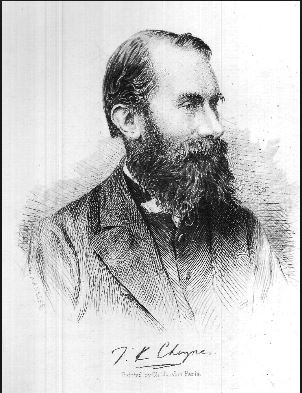
T.K. Cheyne (1841-1915), Biblical scholar and Baha'i.
- Thomas Kelly Cheyne (b. 18th Sept. 1841- 16th Feb. 1915).
- http://hurqalya.ucmerced.edu/node/89
- Joseph Estlin Carpenter (1844–1927), Unitarian minister, Biblical scholar and religious studies, comparative religion, specialist. One time Principal of Manchester College, Oxford, he was learned and published in both biblical studies and Asian religions such as Buddhism. He chaired the meeting in Oxford when `Abd al-Baha' spoke there on the last day of 1912. For his book entitled Comparative Religion in which brief, fairly accurate and positive, E.G. Browne influenced mention is made of the Babi and Baha'i religions see pp. 70-71 (cf. p.188) : https://archive.org/details/comparativerelig00carp
Church Missionary Society (CMS).
A British Anglican related society founded in 1799 and still active today.
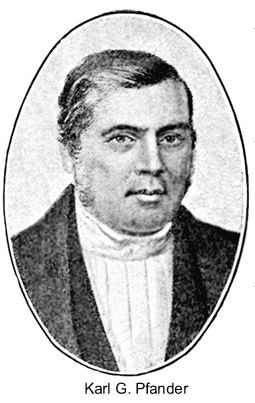
The missionary Dr. Pfander, Caucasus, India, 1825-58.
- Rev. William Glen (1779-1849) of the Scottish mission at Astrakhan. In 1845 his translation of the `Old Testament' direct from the Hebrew with Mīrzā Muhammad Jaʿfar (historical books, rev. and corr. by Jaʿfar) was published by United Associate Synod in Edinburgh. Also with the Henry Martyn Persian New Testament also in Edinburgh by the BFBS in 1846. This was the first complete Christian Bible published in Persian (Darlow and Moule, p. 1206). At this time it is not known whether he came to know anything about the Babi religion before his death in 1849. He probably had...
- Pfander, Karl Gottleib (b. Waiblingen [Wurttemburg, Saxony] 1803- d. Richmond [Surrey, England] 1866). German born protestant Missionary in Armenia, the Caucasus, India and Ottoman Constantinople [Istanbul]. He is perhaps best known as the author of the widely-published and much translated anti-Islamic, Mizan al-Haqq (`The Balance of Truth', 1st ed. Armenian 1831). He may have been in Constantinople-Istanbul when Baha'-Allah was there in 1863 since in 1861 he "was appointed to help fellow Basel graduate S. W. Koelle (d. 1902) establish the CMS mission at Istanbul, a city already familiar to him from earlier travels" (Bennett, 1996:5 [PDf. below] ). For some copyright images of him see:
- Also PDf. http://www.internationalbulletin.org/issues/1996-02/1996-02-076-bennett.pdf
- See also, A. Powell, Muslirns and Missionaries in Pre-Mutiny India (London: Curzon Press, 1992).
- John Zeller/ Johannes Zeller ( b. born Besigheim (near Stuttgart), 1830-d. Jerusalem [?],19th of February, 1902). Protestant missionary in Ottoman Palestine.
- Robert Bruce (b. Cherleville, Co. Cork [Ireland] 1833 - d. Little Dean, Gloucestershire, 1915 [UK]), CMS Missionary in Persia from 1869-1893. One-time Lecturer in Persian at University College London (1895-6), vicar at Durham ( 1896-XXXX) and Rector of Little Dean Gloucester (UK) (1903>). This British missionary with various assistants revised Henry Martyn’s 1812 Persian New Testamant translation first published in St. Petersburg in 1814/15 (D&M 2:1207). The complete Bible translation of Glen and Martyn was also revised by Bruce (and others) between 1893 and 1895 (D&M 2:1209-11). His Bible translation work was carried out with assistance of others including, for example, Karapet Ohaness from Julfa (Persia). Bruce had close contact and correspondence with the great Persianist and Babi-Baha'i expert Edward G. Browne (d. Cambridge, 1926). In various missionary journals and periodicals, he wrote several articles which included comments on the history and status of the Babi and Baha'i religions.See :
- James Jacob Huber (1826-1893), resided at Nazareth during the 1870s,
- Rev. Charles Harvey Stileman (b. Aden, c. 1858-d. Wimbledon, London, 1925).
- William St. Clair Tisdall (1859-1928). A philologically learned missionary who spent time in Isfahan (Persia) and came to write grammars for the following languages: Persian, Hindustani, Punjabi and Gujarati. He researched the `sources' of Islam and the Qur'an with a view to undermining its religious stature and made a number of anti-Babi-Baha'i statements. He revised and enlarged the Mizanu'l-Haqq (Balance of Truth) of C. G. Pfander, D.D (see above). For his writings see :
- http://onlinebooks.library.upenn.edu/webbin/book/lookupname?key=Tisdall%... %2C%201859-1928
- Rev. John Zeller (b. Bisigheim, Wurttemberg, c.1830-d. Wernigerode, Germany, 1902). German then CMS missionary.
- Dr. Henry White (b. London, 1866-d. Bromley, 1950). British CMS missionay in the 1890s in Julfa and Yazd, Persia.
- Rev. J[ohn?]. R. Richards (XXXX), C. M. S., Anglican Missionary at Shiraz, Persia who later lived in Wales. He was the author of the polemical `The Religion of the Baha'is'. London : S.P.C.K., 1932 and `The Open Road in Persia'. London: Church Missionary Society, 1933.
- Canon Edward Sell (d. Bangalore, India, 1932) an Anglican priest who Add here
- J. N. Hoare (XXXX ), CMS., Anglican Missionary in Persia 1933-6. Author of `Something New in Iran' London: CMS., 1937. See http://anglicanhistory.org/me/ir/hoare1937/
American Clergy Scholars and Missionaries
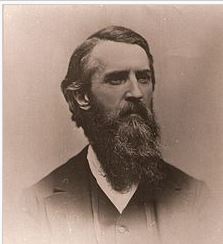
Henry Harris Jessup in 1869
- Henry Harris Jessup (1832–1910), a Yale and Union Theological Seminary educated American Protestant Missionary. This, for a while, Beirut based missionary, is especially famous amongst Baha'is for his early public mention of Baha'-Allah before a western audience at the 1893 `Parliament of the World's Religions' (opened September 11th) in Chicago, USA. He was one of the founders of the Syrian Protestant College (now the American University of Beirut) where the young Shoghi Effendi (1895-1957), later the Baha'i Guardian, was for a while educated. Among his better known writings is the 1910 published Fifty-Three Years in Syria which contains mention of the Babi and Baha'i religion(s). Here and in a number of artricles in missionary periodical, he often engaged in anti-Babi-Baha'i polemic. See, for example, his `The Bab and the Babites' in Missionary Review of the World XXV/XV, 1902, pp. 771-775. Available here : PDf. Jessup+.pdf
- Philip Sidersky (XXXX) the Hebrew Christian evangelist of Baltimore, and Rev. S. K. Braun (XXXX) had an interesting exchange with Mirza Abu'l-Fadl Gulpayigani (d. Cairo, 1914) in Washington (USA) around 1902 which is also recorded in the Missionary Review of the World XXV/XV, 1902, pp. 775-6. See the PDf above at the Jessup link (last 2 pages).
- Stovan Kerstoff Vatralsky (XXXX), Bulgarian anti-Baha'i Christian. "A series of lectures by Stoyan Kristoff Vatralsky, a Bulgarian Christian, was given in Kenosha in the fall of 1899, and his accusations were that the Bahá’í faith was as dangerous as Mohammedisim and Mormonism. The lectures and the controversy were covered by at least three Kenosha newspapers, The Kenosha Kicker, Kenosha Gazette and the Kenosha Evening News" from Diane Giles, `That History Column: Bahá’í faith once had strong following in Kenosha' : URL.:
- Peter Zaccheus Easton (b. New York 1846-d. Tabriz [Persia], 1916). American Presbyterian missionary. The Baha'i scholar and apologist Mirza Abū al-Faḍl Gulpāyigānī wrote (in Syria) on December 28th 1911 his Persian Burhan[-i] Lami` (Burhäne Lämé), "The Brilliant Proof" for this anti-Baha'i missionary. Text downloadable in PDf from Google Books: Gulpaygani-Burhan lami`.pdf
- John Haskell Shedd (b. Gilead, Ohio, July 9th 1833- d. Urumia, Persia, April 12th 1895). This (ABCFM) Presbyterian missionary arrived in Persia in 1859. He was a missionary of the “Nestorian Mission” at Urumiyya (from 1870) and it was from a memorandum found among his papers that, from around 1910 (if not considerably earlier), E. G. Browne became convinced of the Bāb’s biblical awareness. This on the basis of an account of an alleged interview between the Bāb and the British physician resident at Tabriz, William Cormick (d.1294/1877). Cormick allegedly told John Shedd that the Bāb "was seen by some Armenian Carpenters, who were sent to make some repairs in his prison [presumably at Chihriq], reading the Bible". The Bāb, it was apparently said, "took no pains" to conceal his reading the Bible but allegedly informed the Armenian carpenters accordingly (Shedd, `Memorandum‘,12. See `An Interesting Document on the Bāb [A letter of W.A. Shedd to the Editor of the Muslim World, dated Urumia, Persia, August 28th, 1914]’ in The Moslem World, Vol.5 (1915), pp.111-12, also cited in Browne, Materials.. 260-2). William Cormick and two other Persian physicians had been sent to ascertain, apparently on behalf of the Shāh and the Muslim divines of Tabriz ( before July 9th 1850), whether or not the Bāb was of sound mind and thus fit for execution. Cormick must have communicated his favourable impression of the Bāb to John Shedd between 1870 and 1877 (on Cormick see Momen EIr. IV:275-6). On John Haskell Shedd see further the the New Schaff Herzog Encyclopedia of Religious Knowledge (XXX), vol. X p. 388.
- William Ambrose Shedd (1865-1918), DD., a US Presbyterian missionary. Writing in c. 1909 in the New Schaff Herzog Encyclopedia of Religious Knowledge (XXX), vol. VII in his article `Persia' (pp. 470-4), states, "Here [Persia] the history is one of dissent, of schism, of heresy, of new doctrines and strange survivals, of bold speculations and political mysticism. Within the last century Babism, developing into Baha'ism, has been offered by Persia to the world as a universal religion. The claims made for it are extravagant, and it is making little progress, but it testifies to the fertility of the Persian mind, to its discontent with Islam as a social system, and in some of its teachings to the influence of Christianity." (p. 474). A few lectures ) of Shedd (spanning 280 or so pages) were compiled in the volume `Islam and the Oriental Churches: Their Historical Relations; Students Lectures on Missions, Princeton Theological Seminary 1902-3'.
- William Speer (b. New Alexandria, PA., USA., 1822- Washington PA, USA., 1904). Presbyterian Missionary to the Chinese in America.
- George Foot Moore (1851–1931). American Prebsyterian Christian minister and historian of religion. In 1905 he was appointed Harvard Divinity School, `Frothingham Professor of the History of Religion'...
- Robert Elliot Speer (b. Huntingdon, Penn., 10 Sept. 1867 - 23 Nov. 1947), leading authority on Christian missions.
- Samuel Graham Wilson (b. Indiana, Pa. USA., 1858-d. Tabriz, Persia. July 2nd 1916).
- Earl E. Elder (1882-1968).
- William McElwee Miller (December 12, 1892 – July 7, 1993). Presbyterian missionary in Persia for around forty years.
- Hermann Roemer (XXXX)
- Robert P. Richardson (XXXX). This American Christian writer published a number of anti-Baha'i articles in the `Open Court' magazine which was founded in 1887 by Edward Hegeler, having premises in Chicago and La Salle and being the product of the Carus Publishing Company of Peru, Illinois. It hardly fulfilled its mission to be 'Devoted to the Science of Religion, the Religion of Science, and the Extension of the Religious Parliament Idea'. The prolific German-American son-in-law of Hegeler, Paul Carus (1852-1919), was its first managing editor. See https://archive.org/details/opencourt11887caru .
- J.D. France (XXXX), American Presbyterian missionary in Rasht.
Persian-Iran based missionaries.
Syria-Palestine based missionaries
Germany rooted missionaries in Ottoman Palestine - the Tempelgesellschaft.

- Christoph Hoffmann (b. Leonberg 1815 d. 8th Dec. Jerusalem 1885), German theologian and polemicist and founder of the Tempelgesellschaft (`Association of Templers' or `Templars') whose religious orientation was rooted in German Pietism of an highly chiliastic nature.
- On the Tempelgesellschaft.
- An annotated bibliography of the Tempelgesellschaft (`Association of Templers' or `German Templars').

- Georg David Hardegg (1812-1879) and theTempelgesellschaft.
- The Lawḥ-i Hirtik [Hartik] (Lawḥ-i Hardegg) See :
- Commentary on the Lawḥ-i Hartik [Hirtik], Lawḥ-i Hardegg) ] of Baha'-Allah (1817-1892).
Egyptian based Christians of various denominations.
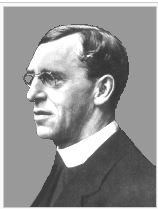
W. H. Temple Gairdner (1873-1928)
- Douglas M. Thornton (1873–1907), an English Christian missionary to Cairo with the CMS from 1898-1907.
- William Henry Temple Gairdner (July 31, 1873 – May 22, 1928), the son of a professor of medicine at the University of Glasgow (UK) this Oxford educated missionary and author lived mostly in Cairo, Egypt. He was a British Christian missionary with the CMS who studied with some of the leading academic experts on Islam of his day, including Duncan Black MacDonald and the Hungarian Ignaz Goldziher.
- http://www.bu.edu/missiology/missionary-biography/g-h/gairdner-w-h-t-wil...



